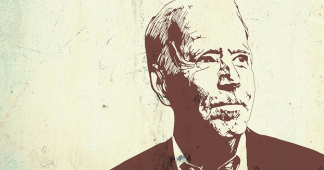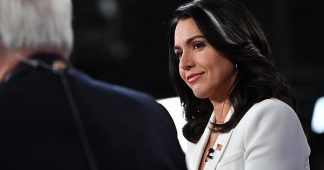It was Halloween in Orlando, and we had piled into a car to make a short trip from the Hilton to an after-party down the road, to wind up the first night of the latest edition of a gathering called the National Conservatism Conference. For at least many of the young people, the actual business of conference going seemed to be beside the point, a gesture at how we used to conduct politics back before life in America spun out of control. There were jokes, or maybe they were serious questions, about whether one of the guys tagging along with us was a fed. I surreptitiously made a few searches of the name he’d given me and was surprised when I couldn’t find a single plausible hit—though that could have been because he was a hyper-secret crypto type; there were some of those floating around. Not that anyone cared. These were people who were used to guarding their words.
“Don’t fuck me here,” a dark-haired woman named Amanda Milius said to me—as she somewhat imperiously dealt with a guy at the door who was skeptical about letting a reporter into the party—“and say we’re all in here sacrificing kids to Moloch. We’re just the last normal people, hanging out at the end of the world.”
I had met Milius outside the Hilton when I asked for a cigarette, and she began to chaperone me around, telling people who eyed my press pass that I was there to profile her as an up-and-coming female director who, she said, had attracted more Amazon streams than any woman ever with her first documentary, a counternarrative about Russiagate. “Annie Leibovitz is still scheduling the photo shoot,” she kept saying. In this world, almost every word is layered in so much irony that you can never be sure what to take seriously or not, perhaps a semiconscious defense mechanism for people convinced that almost everyone is out to get them.
“Oh, fuck,” she said as we walked into a small ballroom where the party was already underway. The room was pitifully quiet, lit in strip-club red, and the sparse crowd was almost entirely male, with a cash bar off in the corner that seemed unable to produce drinks fast enough to buoy the mood. “We have a thing we say,” she said. “ ‘This is what the people at The Washington Post think we’re doing.’ Well, this is exactly what the people at The Washington Post think we’re doing.”
A portly guy running for Congress in Georgia made his way to the front of the room to give a speech heavy on MAGA buzzwords and florid expressions of fealty to Donald Trump.
“This is sad,” Milius said. No one cheered or even seemed interested. But this was not Trumpworld, even if many of the people in the room saw Trump as a useful tool. And these parties aren’t always so lame. NatCon, as this conference is known, has grown into a big-tent gathering for a whole range of people who want to push the American right in a more economically populist, culturally conservative, assertively nationalist direction. It draws everyone from Israel hawks to fusty paleocon professors to mainstream figures like Ted Cruz and Marco Rubio. But most of the media attention that the conference attracts focuses on a cohort of rosy young blazer-wearing activists and writers—a crop of people representing the American right’s “radical young intellectuals,” as a headline in The New Republic would soon put it, or conservatism’s “terrifying future,” as David Brooks called them in The Atlantic.
Continue reading at www.vanityfair.com
We remind our readers that publication of articles on our site does not mean that we agree with what is written. Our policy is to publish anything which we consider of interest, so as to assist our readers in forming their opinions. Sometimes we even publish articles with which we totally disagree, since we believe it is important for our readers to be informed on as wide a spectrum of views as possible.











